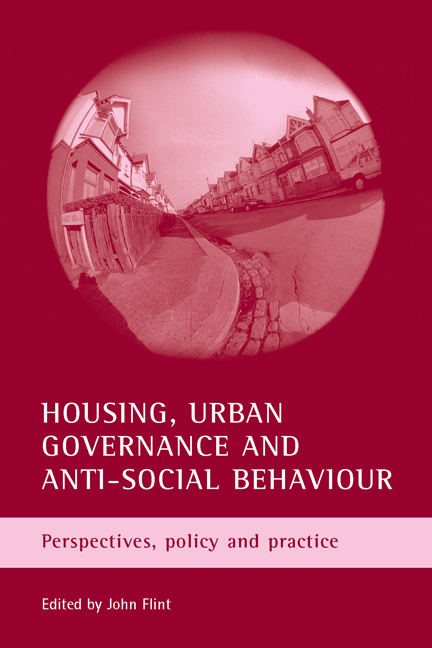Book contents
- Frontmatter
- Contents
- List of tables, figures and photographs
- Acknowledgements
- Notes on contributors
- Introduction
- Part 1 The definition and construction of anti-social behaviour in the UK
- Part 2 Legal techniques and measures utilised by social landlords to address anti-social behaviour
- Part 3 The emerging mechanisms of addressing anti-social behaviour in housing governance
- Part 4 Studies of housing and anti-social behaviour from an international perspective
- Index
one - Housing and the new governance of conduct
Published online by Cambridge University Press: 15 January 2022
- Frontmatter
- Contents
- List of tables, figures and photographs
- Acknowledgements
- Notes on contributors
- Introduction
- Part 1 The definition and construction of anti-social behaviour in the UK
- Part 2 Legal techniques and measures utilised by social landlords to address anti-social behaviour
- Part 3 The emerging mechanisms of addressing anti-social behaviour in housing governance
- Part 4 Studies of housing and anti-social behaviour from an international perspective
- Index
Summary
Introduction
Anti-social behaviour (ASB) has emerged in recent years as a predominant concern for government, media discourse and social housing management in the UK, and a plethora of new legislation and management techniques have been introduced in order to tackle the problem. This chapter has three aims. Firstly, it seeks to place the governance of ASB within the wider context of emerging forms of governance in advanced liberal democracies in order to link studies of housing interventions to policy developments in policing and crime control. Secondly, the chapter aims to assess the extent to which current developments represent a ‘new’ housing governance of conduct rather than a continuation of historical housing management practices. Thirdly, the chapter sets out three central themes that underpin the ‘housing’ governance of ASB: the emergence of community and neighbourhood governance, the rise of contractual governance and the new mixed economy of governing ASB.
The governance of conduct
A defining characteristic of contemporary governance in advanced liberal democracies including the UK is the conceptualisation of subjects as active, autonomous and rational agents (Foucault, 1991; Rose, 1999). Subjects, as consumers or citizens, are identified as being agents and nodes of power through which governmental objectives are to be achieved; less through direct acts of state intervention, but rather by reshaping the behaviour of autonomous citizens. In this ‘governance at a distance’, the self-regulation of individuals is utilised as ‘technologies of the self ‘ to achieve governmental aims, combined with enhanced roles for non-state actors and organisations (Dean, 1999; Hope, 2000; Garland, 2002). Subjects become identified as individuals desiring autonomy and responsibility for their own life outcomes and are to be empowered to have the capacities, opportunities and responsibilities to do so (Foucault, 1991; Rose, 1999; Forrest and Kearns, 2001).
Such empowerment and freedom are not limitless, but rather operate within a framework of bounded autonomy (Etzioni, 1995) built on a moral dominant discourse shaped by government and other forces such as the media, of what constitutes required, appropriate and ‘correct’ behaviour (Dean, 1999). These discourses construct ‘grammars of living’ (Rose, 2001) which establish rules for conduct based around norms and values.
- Type
- Chapter
- Information
- Housing, Urban Governance and Anti-Social BehaviourPerspectives, Policy and Practice, pp. 19 - 36Publisher: Bristol University PressPrint publication year: 2006



